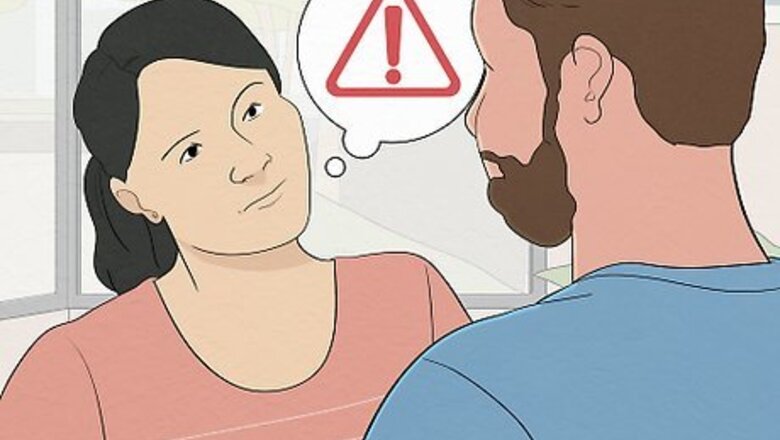
views
X
Trustworthy Source
Centers for Disease Control and Prevention
Main public health institute for the US, run by the Dept. of Health and Human Services
Go to source
You can take steps to prevent being in a situation that could lead you to be assaulted by a sexual predator, like ensuring you are aware of your surroundings at all times, taking precautions to protect your privacy online, and having others help you when situations seem uncomfortable. Most importantly, trust your instincts. If something doesn’t feel right to you, find a way to get out of the situation. You do not need to be polite, you need to be safe.
Protecting Yourself in Social Settings

Trust your instincts. If something feels “off,” trust your gut: It probably is. Many times people ignore their gut instincts out of politeness or not wanting to hurt someone’s feelings. You are always allowed to leave a situation without explanation, but especially when you feel threatened. While this may be more difficult in situations where you know the person who is making you uncomfortable (and in some instances, may even be related to them), keep in mind that most sexual assault victims know their perpetrator. Three out of four rapes were committed by someone known to the victim, while 93% of juvenile sexual abuse victims knew their abuser. It can be very difficult to stop caring about what other people think. If you are still feeling compelled to stay in an uncomfortable situation, you could think to yourself: They started it! The person who is making you feel uncomfortable clearly doesn’t care about your feelings, so why should you care about theirs?
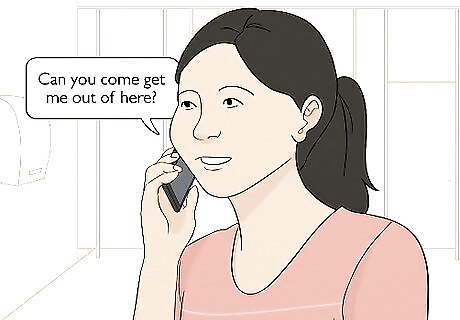
Have a plan to get out of an uncomfortable situation. Think about what you might do if you were at a party and someone started touching you in a way that made you feel uncomfortable. What would you say? How would you get away? Planning ahead and visualizing your response will help you feel more confident and prepared in case something were to happen. Make sure someone else not at the event knows where you’ll be and who you’ll be with. If you are going to an event with your friends, talk to each other beforehand about looking out for each other, or coming up with an emergency “get me out of here” word that can be employed when someone feels unsafe. For example, if you are meeting someone new for a drink at a restaurant and they are making you uncomfortable, you could excuse yourself to the bathroom and inform a server you need help, ask the kitchen staff if you could leave through the back entrance, or ask another person in the bathroom for assistance.

Use your own transportation. Don’t rely on someone else to take you home. Drive yourself or take public transit. If you’ve had too much to drink, call a taxi or use a ride service, or ask a trustworthy friend. Always carry extra cash for a taxi. Be wary of offers of rides from strangers, even if they appear concerned.

Watch your drink. Keep your eye on your drink at a party. Keep in mind that alcohol is often used to help commit sexual assault. Make sure that you know the strength of your alcoholic drinks, your tolerance level, and that no one is spiking them with additional alcohol. Be very wary of others buying you drinks. You could accept the drink and not drink it or put it down somewhere and “forget” it. Hold onto your drink and cover it with the top of your hand. Watch the bartender or party host make your drink or open your drink in front of you, even if it’s just a bottle of water. Predators can drug your drink to make you feel extremely drunk, confused, or weak, and likely be unable to defend yourself from a sexual assault. These drugs are commonly known as “date rape drugs” and include Rohypnol, GHB, and ketamine.

Look out for others. Pay attention to behavior that may be making another person uncomfortable. Do not hesitate to intervene and offer assistance. For example, say you are at a party and notice a man groping a woman who seems very intoxicated. Team up with another guest to help extract her from the situation. You could go over to her and say, “We have been looking for you! We have the best news we want to share!” Pull her away from the other person and ask her if she needs help. If the man seems dangerous, consider alerting the party host and/or calling the police.
Taking Everyday Precautions

Stay safe in your home. Make sure you have your doors and windows locked. Close your curtains at night. If you hide a spare key outside your house, make sure it is in a well-hidden spot, not under the doormat. Even better, give a spare key to a neighbor you trust. Keep your phone by your bed. Consider putting a security company’s sticker on your window or sign in your yard to serve as a deterrent, even if you don’t have a security service. If you feel you are being followed on your way home, don’t go home. Switch directions and head toward a public place instead.
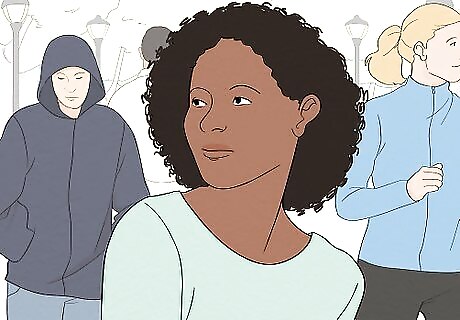
Be aware of your surroundings. It is easy to be in your own little world out in public places, wrapped up in a phone or daydreaming, and zone out as to what’s in front of you. However, stay alert to any suspicious behavior or anyone who makes you feel uncomfortable. If you can, make a mental description of a suspicious individual’s appearance, including your best guess of their age, height, weight, and ethnicity. When walking or running, stay on populated, well-lit paths. Do not wear headphones. In general, keep your eyes peeled for anyone who seems to be giving you a little too much attention.
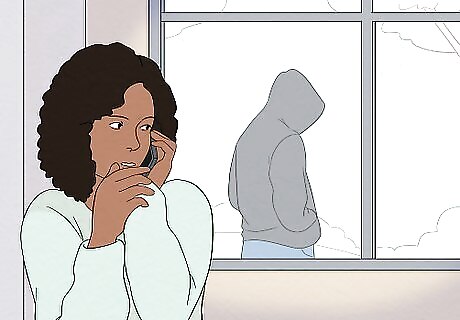
Enlist help if you are being followed. If you feel as though you are being followed, you want to attract the attention of as many people as possible. Don’t be scared to reach out for help, even though you may be afraid of appearing paranoid. Most people will be willing to help you. Duck into a store or restaurant and get help from employees. You could approach a person or group of people and say loudly, “Oh, there you are! I’ve been looking all over for you!” Once out of earshot, explain the situation and ask if they can help you. If there is no one else around and you can’t enter a building safely, try making, or pretending to make, a call on your cell phone. You could say, “When are you coming to pick me up, Dad? I’ve been out here for fifteen minutes!” Always call 911 if you feel threatened. It’s better to be safe than sorry.

Know where you are going. Map out your destination ahead of time. If you know you will be in an unsafe area, go with someone else. Walk as if you know where you’re going, even if you’re lost. If you’re lost, find a police officer to help you. Women with children are also a good option. Avoid walking alone at night if you are in an unfamiliar area. Walk with a friend or get a ride.
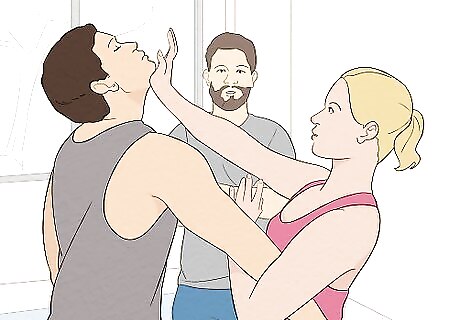
Enroll in a self-defense class. Consider that in only 11% of rape and sexual assault incidents, an attacker used a weapon. Learning how to defend yourself from kicks, punches, and being restrained can give you a chance to escape your attacker. You can often find these classes in community centers, colleges, or in martial arts studios. Consider carrying a keychain with a whistle or other small, self-defense device attached to it. You can find these available for sale online.

Use technology to help you stay safe. Most people carry their phone all the time, so take advantage of some of the safety features on your phone. Most importantly, make sure yours is fully charged before going out. There are several mobile apps you can install on your phone that let you call for help or alert friends to your location. Try searching for “personal safety phone apps” to get started.

Draw attention to yourself if you feel threatened. If someone is making you uncomfortable and you can’t get away, get loud. Make a scene. Thrash and flail around. Remember, being safe is more important than being nice and polite. For example, if someone sits next to you on the bus and intentionally leans too far into your personal space, yell, “Get away from me!” Attract attention and have others help you deal with the situation. Do not be afraid to defend yourself if you feel you are being threatened with physical harm.
Protecting Yourself Online
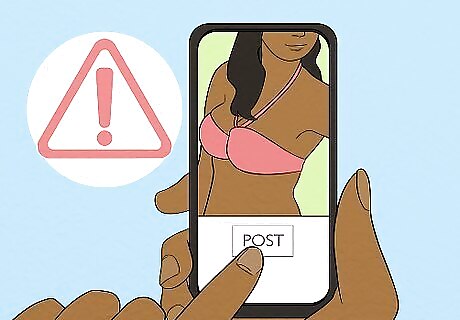
Be careful what you share online. Make sure you have appropriate privacy protections in place. Remember that even photos, comments, and locations shared to only friends can be screenshotted and passed along to others. You run the risk of everything you share to be shared with the world (and saved forever), so think twice before you post. Predators may have access to everything you share. You can do privacy check ups on all social media sites and make sure you are sharing what you want to share. You can also go back and edit or delete old posts if you wish. For more information, check out the privacy settings of your social media platform, like Facebook, Instagram, or Twitter. Report harassing comments or images to the social media platform. Delete anything you are not comfortable with, and block any users who are making you uncomfortable.
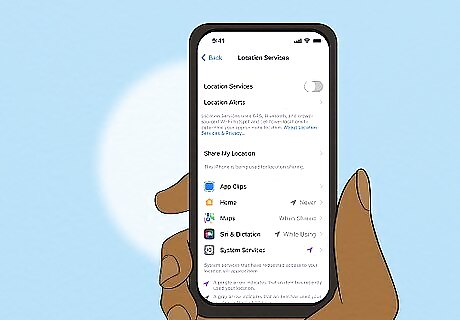
Disengage location settings. Do not let others know where you are located in posts or profiles. Showing your location lets a potential predator easily find out where you are. If you are comfortable sharing your location, you could also broaden your location to a metro area rather than a specific town. For example, “Bay Area” or “Greater NYC.”
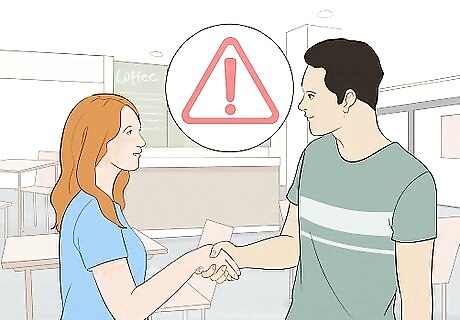
Be cautious when meeting in person. Many people are meeting others through the internet today, either through dating websites or friend groups, and most of the time, these get-togethers go off without a hitch. However, you still need to proceed cautiously the first time you meet someone you met on the internet. A person can easily misrepresent who they are online. Meet the person in a public place, like a busy coffee shop, for the first time. Tell a friend your plans, and have them call or text you while you’re there to check in. Come up with a code word to use if things are not going well, and the friend can help you leave the situation easily. If you need to travel in order to meet this person, do not tell the person where you are staying. Stay at a hotel or a friend’s house, not with them. Utilize your own transportation during the trip.

Do your homework. Spend some time planning for your meeting so that you can be comfortable. Develop backup plans if the meeting does not go well. Do an online search. Look up the person you are about to meet to verify they have given you the correct information. You may wish to look them up on the National Sex Offender Public Website to see if they are a registered sex offender. Have an exit plan. Tell the person you can only meet for an hour, or have another event to attend. Use your own transportation so you don’t need to rely on the person for a ride.

Back out if you’re uncomfortable. It’s okay to lie to get out of an engagement. It’s also okay to be impolite if you are feeling harassed; for example, if the person won’t take “no” for an answer. Trust your instincts and get out of the situation. For example, say you are on a first date. Your date keeps insisting you get the bill and head back to their place. You are not interested and want to leave. You could say, “I can’t. I promised my roommate I’d let her dog out tonight.” If your date keeps pressing you, just say, “No, I’m sorry,” and leave as soon as you can.














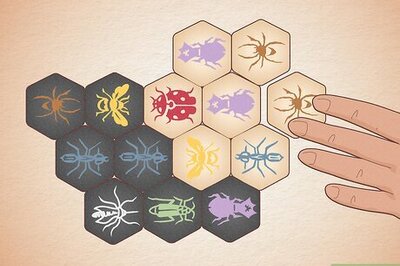
Comments
0 comment